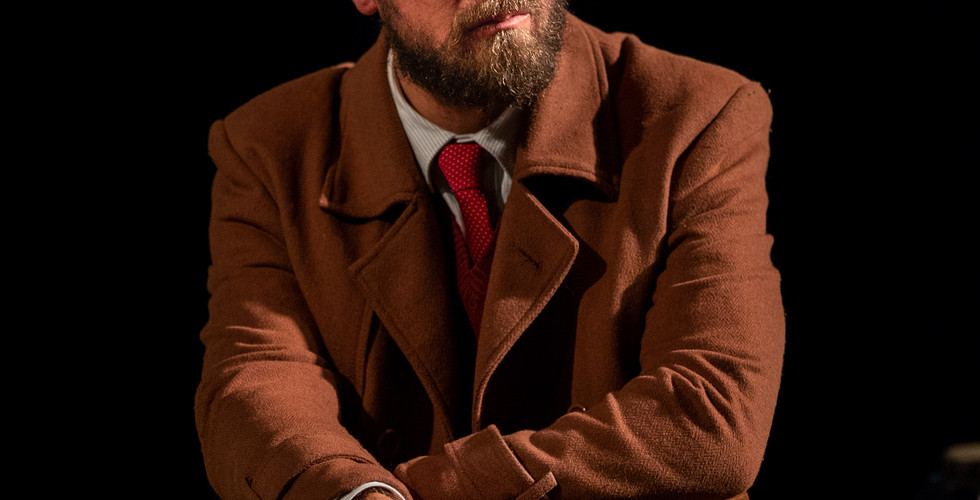Review: Collaborators at The New Theatre
- Jun 7, 2019
- 4 min read
By Fred Pryce
Joseph Stalin has become something of a meme in recent years—with the longstanding rule of the USSR at a safe remove, their aesthetic and particular brand of bureaucracy are novelty and able to be mined for comedy and a sort of nostalgic affection, and Stalin’s reputation as a brutally controlling dictator only adds to the subversiveness. Collaborators, by Trainspotting screenwriter John Hodge, treads a fine line between political parable and this memeification, and mines a lot of dark comedy from the result. It’s certainly a screenwriter’s play, with a large variety of locations and interconnected scenes, but this serves to distinguish it from the number of stuffy chamber pieces soaking up stages (meanwhile, The Death of Stalin is a film of many similarities).
Drawn from historical fact, our somewhat-hero is the playwright Mikhail Bulgakov, who in 1938 is attempting quiet resistance to the authoritarian government, before being coerced into writing a propagandistic play about Stalin’s life by the secret police. The Kafka-esque chaos of this paranoid society, where anyone could be arrested for treason at any time, is conveyed by a comic surreality, from a fellow comrade living inside Bulgakov’s closet to repeated dreams of Stalin chasing him around Benny Hill-style. This comes to a head when he begins to actually meet the dictator in an unreal fashion, and they begin to switch jobs: Stalin as playwright, while Bulgakov makes tough state decisions. This allows the play to investigate how easy it is to give in to the ‘monster’ of authority, when given a smidgen of its power to keep for yourself, in a standard fall-from-grace package. Richard Cotter’s Stalin is childish, flamboyant, yet somehow still scary, bantering innocently with the writer while manipulating him into carrying out horrific purges.
Director Moira Blumenthal and designer Colleen Cook heighten this with impressionistic flair, the walls of Bulgakov’s shabby apartment jutting out at strange angles, while actors and props emerge from unexpected nooks and crannies. Martin Kinnane's lighting has all the mystery and danger of noir, featuring long, slim corridors of light like alleyways, or top-down spotlights mimicking an interrogation room. The use of music and sound effects also lends the play a cinematic edge, and Patrick Howard’s sound design is perfectly tuned into the various shades of tension, comedy, and sadness, if the play’s length means these tracks often repeat. Most importantly, Blumenthal stages every scene interestingly and differently, often blending in to one another and creating the feel of a single unending nightmare. It is only during the more surreal sequences that the seams begin to show, as some flashing lights don’t create the same disarming spectacle that a greater allotment of budget and time would allow. I wished during headier moments for the set to move and somehow close in to further the claustrophobic intent, as it was often left to just a couple of actors within a roomy space.
Andy Simpson as Bulgakov is a solid pillar amidst the disarray, both pathetic and admirable by turns (like Jason Bateman in Arrested Development, both in role and resemblance). The extended ensemble all do fine work in executing the finely coordinated disorder, though I wish more of them were part of the rehearsals for the ridiculously pro-Stalin play (some needed silly relief from all the darkness). What I most enjoyed was the physiological toll that the ideological journey has on our protagonist. His sudden successes and failures leave distinct marks on his body and mind, from a mysterious skin condition that looms behind him to the mental exhaustion of trying to maintain your beliefs whilst simultaneously upending them to survive. This is reflected not only in the text, but in the ways that scenes ambiguously flit between each other, and the bending line between reality and fiction.
The piece has (unfortunately) gained some added relevance here as of late. With federal police raiding the ABC for exposing war crimes, and the ATO whistle-blower facing 161 years in prison, the need to remain defiant of authority is urgently clear. What stands out the most is the whistle-blower’s admission of “almost dying from the stress”: the physical and mental consequences echoing those that plague Bulgakov.
However, such political parallels will always remain common (again, unfortunately), and the need to tell a compelling story is of far greater importance, which the play achieves until it begins to falter and feel overlong in the second act. After laying out all of the groundwork, there isn’t much left except to watch Bulgakov’s descent into complicity, while the confusion and darkness around further encroaches. For all Hodge’s cleverness, occasionally the play veers near the very type of ideological agitprop that it is making fun of, a paean to liberal virtue from a safe historical perspective, that doesn’t ask of us anything but to tut knowingly at all the oppression taking place. It’s not that the perspective is necessarily wrong, but just a little tedious if you’re already aware of the history (which the rest of the play already assumes you are). Also disappointing is the lack of sizeable roles for women, with the largest (that of Bulgakov’s wife) being somewhat thankless. But Collaborators is on the whole amusing, creative, and smart about its history, even if the writing never reaches the dizzying heights it could soar to. Just no-one tell Stalin about it, or else.
Photo Credit: Bob Seary
All opinions and thoughts expressed within reviews on Theatre Travels are those of the writer and not of the company at large.
































